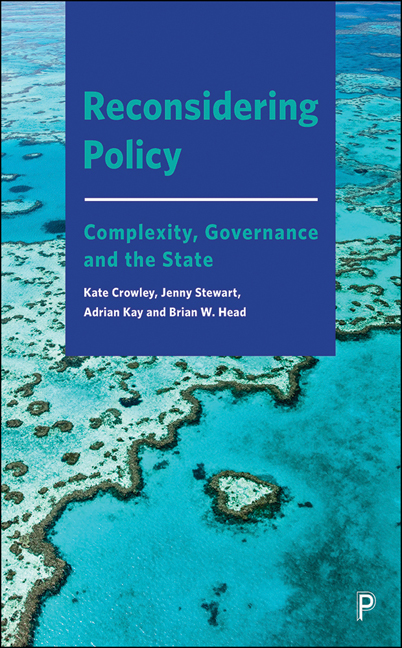Book contents
- Frontmatter
- Contents
- Detailed contents list
- List of tables
- List of abbreviations
- Notes on authors
- Preface: Re-Thinking the Policy Sciences after the ‘Governance Turn’ – Identifying and Creating a (more) Capable State
- 1 Reconsidering Policy – our Agenda
- 2 Reconsidering Policy Systems
- 3 Reconsidering Institutions
- 4 Reconsidering the State
- 5 Reconsidering Borders
- 6 Reconsidering Advice and Advisory Systems
- 7 Reconsidering Information
- 8 Reconsidering Implementation
- 9 Reconsidering Policy Change
- 10 Reconsidering Policy – our Agenda Revisited
- References
- Index
Preface: Re-Thinking the Policy Sciences after the ‘Governance Turn’ – Identifying and Creating a (more) Capable State
Published online by Cambridge University Press: 23 February 2021
- Frontmatter
- Contents
- Detailed contents list
- List of tables
- List of abbreviations
- Notes on authors
- Preface: Re-Thinking the Policy Sciences after the ‘Governance Turn’ – Identifying and Creating a (more) Capable State
- 1 Reconsidering Policy – our Agenda
- 2 Reconsidering Policy Systems
- 3 Reconsidering Institutions
- 4 Reconsidering the State
- 5 Reconsidering Borders
- 6 Reconsidering Advice and Advisory Systems
- 7 Reconsidering Information
- 8 Reconsidering Implementation
- 9 Reconsidering Policy Change
- 10 Reconsidering Policy – our Agenda Revisited
- References
- Index
Summary
This book is premised on the idea that good policymaking requires a capable state and the observation that much contemporary policy literature is not helping achieve this goal. Among the many causes of this problem is singled out what might be called ‘the Governance turn’ in policy studies in recent decades. This turn is blamed for having led to an epistemological and practice-oriented dead-end in policy studies by replacing more traditional and time-honoured ways of thinking about the state with abstract ideas about the merits of enhanced participatory processes. By continually promoting the advantages of collaboration and co-production over state-based goods and service delivery, it is argued, this approach has de-politicised many aspects of contemporary policy studies and contributed as well in the failure of governments meeting many current policy challenges.
The differences between a policy-oriented approach and those that have focused more on governing are clear. ‘Governing’ is what governments do, that is, controlling the allocation of resources in society and providing a set of rules and institutions setting out ‘who gets what, where, when, and how’ in society. A policy orientation towards better governing thus highlights the kinds of resources and capacities governments have in meeting policy challenges, as well as what it is that makes policy formulation and implementation efficient and effective. ‘Governance’, on the other hand, is a term used to describe the mode of government coordination exercised over social actors in the governing process. Viewed from a policy perspective, the ‘Governance’ turn has been all about establishing, promoting and supporting a specific type of relationship between government and non-government actors in the governmental and policy processes, one which is horizontal or ‘plurilateral’ rather than a more traditional vertical or ‘hierarchical’. Rather than focus on the attainment of policy ends, it instead is focused almost exclusively on the processes through which that delivery occurs.
In itself this is not a terminal issue and such an arrangement may well be preferable in certain areas of state activity such as education or health care which require a great deal of social support and activity if training and wellness goals are to be achieved.
- Type
- Chapter
- Information
- Reconsidering PolicyComplexity, Governance and the State, pp. xi - xivPublisher: Bristol University PressPrint publication year: 2020

